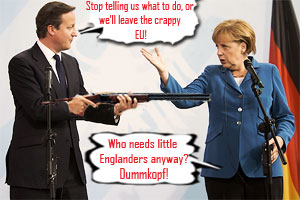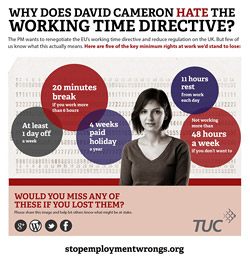Leaving The EU Will Result In Loss Of Employment Rights, Work Breaks, Holidays And H&S Protection
The debate over Europe continues with the British people being in the main unaware of what it would actually mean for workers, or any knowledge of the laws that are forced upon us by the EU – except those which relate to workers rights in terms of employment law and health and safety protection.
 History shows that the majority of legislation introduced in the UK which benefits working people, originated from the European Union; and not the UK government.
History shows that the majority of legislation introduced in the UK which benefits working people, originated from the European Union; and not the UK government.
The TUC have confirmed this when it issued its statement on Europe earlier this month:
"Social Europe has provided working people with more equality, more protection from redundancy, more information about what's happening at their workplace, as well as a shorter working week and paid holidays. The government wants to take that away from working people, and make them work longer hours for less pay."
When asked, which areas of laws are forced upon us, Ministers and MPs can only quote the usual – employment regulation; and in particular the Working Time Directive.
Commenting, Chris Ingram, Unionsafety website editor said:
"When many Trade Unionists were saying in 2010 that the true intention of the Coalition was to remove all employment rights, including health and safety legislation; and that pulling out of Europe would be their main enabler to reach their goals; the vast majority of people accused us of being extreme and of scaremongering."
He continued:
"It is now not surprising that 2 years on, many commentators now agree with the view expressed in the headlines of this article. The view of many within the Trade Union movement and the health and safety community is that;
the real aim of the Tory-led ConDem(ned) coalition government goes even further than the TUC statement above.
 Cameron and co intend to do away with work breaks, paid time off for training, holidays, the minimum wage, maternity rights, health and safety protection, especially such regulations around DSE working, stress, WRULDS and in short; anything which places upon the employer a commitment to provide safe, healthy workplaces and well paid jobs."
Cameron and co intend to do away with work breaks, paid time off for training, holidays, the minimum wage, maternity rights, health and safety protection, especially such regulations around DSE working, stress, WRULDS and in short; anything which places upon the employer a commitment to provide safe, healthy workplaces and well paid jobs."
All of these principled issues of course are what created the need for the Trade Union movement, without which such basic rights implicit in regulations concerned with these provisions in the workplace would have been won.
None of this is lost on the TUC of course.
Last week, the TUC accused the Prime Minister of 'tilting at windmills' ahead of his speech on the European Union.
Conservative MPs wrongly accuse the Working Time Directive of being a burden on the UK economy, says the TUC, yet David Cameron initially chose to make his big speech in the Netherlands - a country which has long abandoned excessive working hours in favour of higher productivity.
The latest figures on working time from the Organisation for Economic Co-operation and Development (OECD) show that the average Dutch worker spends 1,379 hours at work each year, producing $82,460 in GDP value (£51,452 at today's prices).
The average UK worker spends 1,625 hours a year at work yet only produces $76,700 in GDP value (£47,859 at today's prices) - making Dutch productivity per hour 27 per cent higher than UK productivity, and allowing Dutch workers five more hours a week of their own.
 TUC General Secretary Frances O'Grady said:
TUC General Secretary Frances O'Grady said:
“The government should abandon its obsession with the Working Time Directive which guarantees millions of people a paid holiday and stops dangerous work being done by exhausted people.”
She added:
“Forcing people to work longer hours is not the answer.
Instead of tilting at the windmill of the Working Time Directive, the Prime Minister should be taking steps to raise UK productivity to Dutch levels and beyond, through more investment in training, jobs, infrastructure and a better work-life balance.
It seems strange that David Cameron has chosen the Netherlands for [his] speech - a country which still manages to produce more than the UK, despite its workers leaving work on average an hour earlier every working day.”
The TUC statement on Europe made it clear of course that they, at least, are not fooled by David Cameron's rhetoric:
"The TUC executive committee believes that the government's call to repatriate powers from the European Union is a smokescreen for plans to launch further attacks on ordinary people's employment rights and could put thousands of jobs at risk.", the statement says.
The TUC statement goes further:
"First, the Government wants to take away the rights working people have gained over the last thirty years from the European Union.
Second, the Prime Minister is playing politics with Britain's future prosperity to appease the Eurosceptics. His dithering about a referendum is deeply damaging to Britain's economic interests, threatening our trade relationships and creating uncertainty which is harming investment prospects, especially in manufacturing."
The TUC concludes by criticising the one thing that David Cameron does agree with the European Union on:
"The one area where the government goes along with the rest of Europe's governments is in the self-defeating policy of austerity, which has brought poverty and misery to millions around Europe and here in Britain. It should instead be devoting its efforts to promoting growth and jobs, calling on the European Union to listen to the evidence from the IMF and OECD and change course on austerity."
Source: TUC / OECD